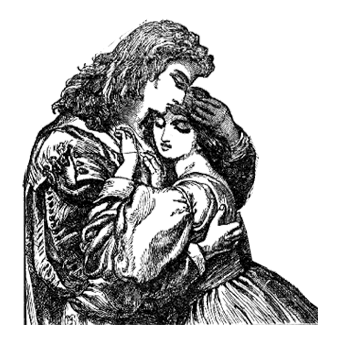“Oh, then, my dear saint,” said Romeo, “hear my prayer, and grant it, lest I despair.”
In such like allusions and loving conceits they were engaged when the lady was called away to her mother. And Romeo, inquiring who her mother was, discovered that the lady whose peerless beauty he was so much struck with was young Juliet, daughter and heir to the Lord Capulet, the great enemy of the Montagues; and that he had unknowingly engaged his heart to his foe. This troubled him, but it could not dissuade him from loving. As little rest had Juliet when she found that the gentle man that she had been talking with was Romeo and a Montague, for she had been suddenly smit with the same hasty and inconsiderate passion for Romeo which he had conceived for her; and a prodigious birth of love it seemed to her, that she must love her enemy and that her affections should settle there, where family considerations should induce her chiefly to hate.
It being midnight, Romeo with his companions departed; but they soon missed him, for, unable to stay away from the house where he had left his heart, he leaped the wall of an orchard which was at the back of Juliet’s house. Here he had not been long, ruminating on his new love, when Juliet appeared above at a window, through which her exceeding beauty seemed to break like the light of the sun in the east; and the moon, which shone in the orchard with a faint light, appeared to Romeo as if sick and pale with grief at the superior luster of this new sun. And she leaning her cheek upon her hand, he passionately wished himself a glove upon that hand, that he might touch her cheek. She all this while thinking herself alone, fetched a deep sigh, and exclaimed:
“Ah me!”
Romeo, enraptured to bear her speak, said, softly and unheard by her, “Oh, speak again, bright angel, for such you appear, being over my head, like a winged messenger from heaven whom mortals fall back to gaze upon.”
She, unconscious of being overheard, and full of the new passion which that night’s adventure had given birth to, called upon her lover by name (whom she supposed absent). “O Romeo, Romeo!” said she, “wherefore art thou Romeo? Deny thy father and refuse thy name, for my sake; or if thou wilt not, be but my sworn love, and I no longer will be a Capulet.”
Romeo, having this encouragement, would fain have spoken, but he was desirous of hearing more; and the lady continued her passionate discourse with herself (as she thought), still chiding Romeo for being Romeo and a Montague, and wishing him some other name, or that he would put away that hated name, and for that name which was no part of himself he should take all herself. At this loving word Romeo could no longer refrain, but, taking up the dialogue as if her words had been addressed to him personally, and not merely in fancy, he bade her call him Love, or by whatever other name she pleased, for he was no longer Romeo, if that name was displeasing to her. Juliet, alarmed to hear a man’s voice in the garden, did not at first know who it was that by favor of the night and darkness had thus stumbled upon the discovery of her secret; but when he spoke again, though her ears had not yet drunk a hundred words of that tongue’s uttering, yet so nice is a lover’s hearing that she immediately knew him to be young Romeo, and she expostulated with him on the danger to which he had exposed himself by climbing the orchard walls, for if any of her kinsmen should find him there it would be death to him, being a Montague.
“Alack!” said Romeo, “there is more peril in your eye than in twenty of their swords. Do you but look kind upon me, lady, and I am proof against their enmity. Better my life should be ended by their hate than that hated life should be prolonged to live without your love.”
“How came you into this place,” said Juliet, “and by whose direction?”




